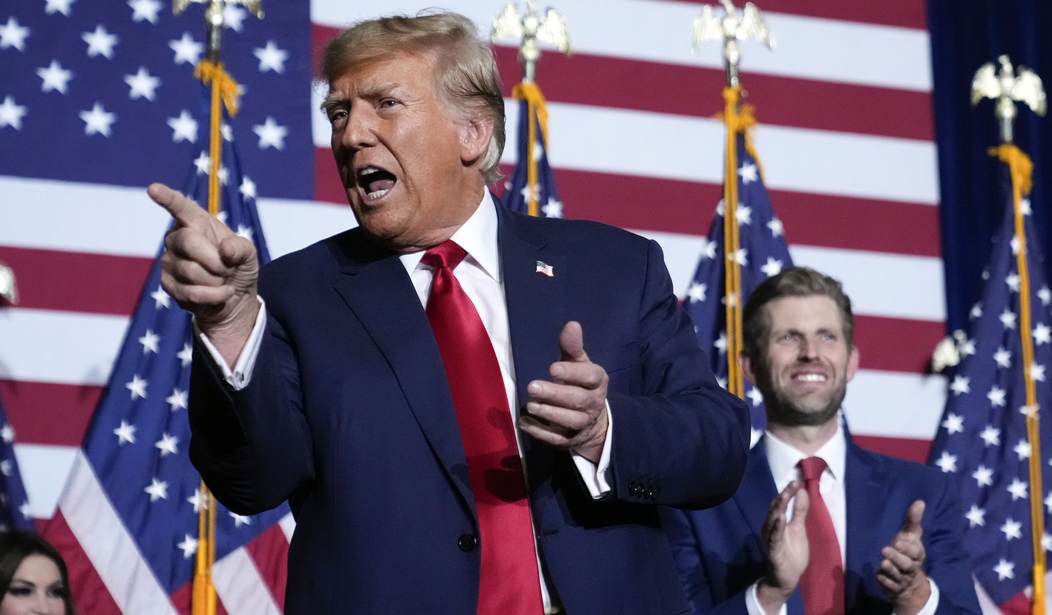The stakes remain high when it comes to the U.S. Supreme Court announcing earlier this month that it would take up the case regarding the Colorado Supreme Court kicking Donald Trump off the ballot due to certain interpretations of Section 3 of the 14th Amendment about insurrections. Maine's Secretary of State Shenna Bellows had also decided that Trump was not eligible to be on her state's ballot. On Wednesday, though, Maine Superior Court Justice Michaela Murphy deferred that decision, with Bellows being told to wait until the U.S. Supreme Court rules on the matter. Bellows wasn't too happy with that directive, though, and has now appealed to the Law Court.
As The Hill, which had reported on Wednesday's decision as well, noted:
Bellows had warned that punting the decision on Trump’s eligibility would put Maine in a “precarious position,” saying voters may end up casting their votes with Trump’s qualification in doubt. The state’s Super Tuesday, March 5 primary is fast approaching, and the Supreme Court won’t hear oral arguments until next month, Bellows noted.
“A stay of this proceeding, followed by a February decision from the U.S. Supreme Court, may ultimately force the Secretary and her staff to scramble to minimize damage to the integrity of the March 5, 2024 election,” the Maine attorney general’s office, representing Bellows, had written in court filings.
Bellows filed a notice of appeal Friday, bringing the dispute to the state’s top court, known as the Law Court in this context.
Maine state law prescribes a speedy timeline for the court to act. The parties will now have four days to file their written briefs, and the court is obligated to issue its decision within 14 days of the judge’s ruling from Wednesday.
Bellows, who was not elected by Maine voters but rather by the Democratic-controlled state legislature has come under scrutiny for how she has also been quite cozy with President Joe Biden. The November election likely being a rematch from 2020 between Biden and Trump.
The Trump campaign remains confident, as evidenced in a statement from Trump spokesperson Steven Cheung.
"Today, Maine’s Superior Court ruled to keep President Trump’s name on the ballot, pending a decision from the Supreme Court of the United States in the Colorado case. This is a correct action, and we remain steadfast in our opposition to these bad-faith shams. President Trump is confident that we will ultimately prevail with a fair ruling on the issues in front of the Supreme Court. In states across the country, Crooked Joe Biden and his Democrat apparatchiks, through Soros-funded front groups, have weaponized the institutions of government to interfere in the upcoming election and disenfranchise over a hundred million voters. The Democrats are desperate to cling to power by any means necessary. We will not stop fighting the remaining bogus, bad-faith 14th Amendment ballot challenges and President Trump looks forward to winning the state of Maine later this year, being re-elected in November, and he will Make America Great Again," Cheung said on Wednesday.
Recommended
When it comes to the scope of the Supreme Court's ruling, Curt Levey, a constitutional law attorney and the president of the Committee for Justice, weighed in about how that could apply to other states. "While it’s possible the U.S. Supreme Court will rule so narrowly that the decision applies only to Colorado, it’s very unlikely because the Court surely doesn’t want to revisit this issue later this year," he noted, his statement addressing Maine.
Levey had also weighed in once more following the Maine Superior Court's decision. "The ruling is a bit of a brushback to Bellows, noting she should be given the opportunity to reassess a rushed decision. But mostly the ruling is just a common sense decision to wait for the U.S. Supreme Court to weigh in," he told Townhall in a statement on Wednesday.
Meanwhile, Trump has had assistance at the Supreme Court with briefs from Republicans, including those in Congress and at the state level. On January 5, the Republican National Committee (RNC) and National Republican Congressional Committee (NRCC) announced that they had filed an amicus brief with the Court to keep Trump on the ballot. Attorneys General Todd Rokita of Indiana and Patrick Morrisey of West Virginia announced that they were co-leading an effort of 27 states to keep Trump on the ballot and had filed an amicus brief of their own.
On Thursday, Sen. Ted Cruz (R-TX) and House Majority Leader Steve Scalise (R-LA) announced that they, along with more than 170 members of Congress, had filed an amicus brief with America First Legal and Boyden Gray PLLC in support of keeping Trump on the ballot.
"The radical left consistently does what they claim their opponents are doing. While President Biden and his allies claim they are defending democracy, their supporters are working to undermine democracy by banning Biden’s likely general election opponent from appearing on the ballot. The American people see through this, and I’m confident the Supreme Court will as well. I’m proud to work with Leader Scalise and our fellow legislators to defend the Constitution’s separation of powers, and the ability of the American people to decide who their next president will be," Cruz stated.
Oral arguments will begin on February 8 in the Supreme Court case of Trump v. Anderson. Both Colorado and Maine are among the 16 states and territories holding primaries on March 5, which is known as Super Tuesday.
I’m proud to work with Leader Scalise and our fellow legislators on this Supreme Court amicus brief to defend the Constitution’s separation of powers and the ability of the American people to decide who their next president will be.https://t.co/xHXdRdbNyV
— Ted Cruz (@tedcruz) January 18, 2024























Join the conversation as a VIP Member